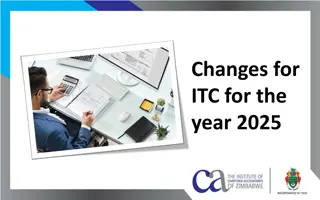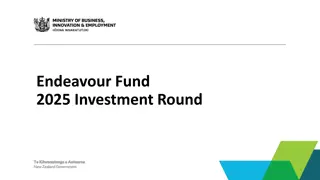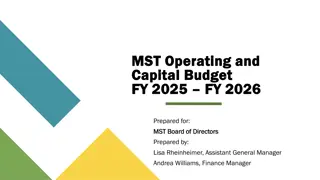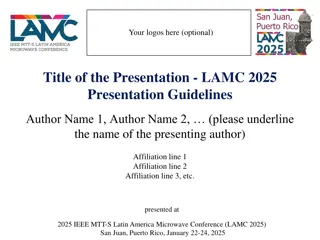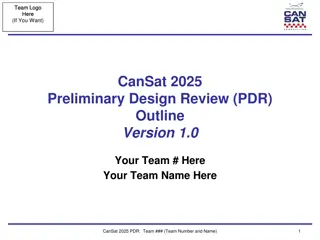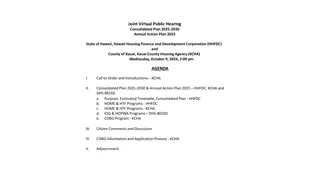
Tax Planning and Wealth Management Strategies for Your Future 2025
Explore comprehensive tax planning and wealth management strategies for the year 2025, covering topics such as tax structure, income analysis, deductions and credits, and college planning. Discover how to optimize tax savings and investment opportunities for a secure financial future.
Download Presentation

Please find below an Image/Link to download the presentation.
The content on the website is provided AS IS for your information and personal use only. It may not be sold, licensed, or shared on other websites without obtaining consent from the author. If you encounter any issues during the download, it is possible that the publisher has removed the file from their server.
You are allowed to download the files provided on this website for personal or commercial use, subject to the condition that they are used lawfully. All files are the property of their respective owners.
The content on the website is provided AS IS for your information and personal use only. It may not be sold, licensed, or shared on other websites without obtaining consent from the author.
E N D
Presentation Transcript
Taxes & Planning For Your Future 2025 CONFIDENTIAL - For Traphagen CPAs & Wealth Advisors, clients, and prospective clients use only. All asset class allocations are approximate and performance information is presented gross of fees through most recent month available.
Foundation: Taxes, Structure, Strategy Strategy Taxes Structure The first place to examine is your tax return. This reveals many considerations on potential strategies that may be available to you. Taxes are first as any tax savings is a return that can then be compounded via a sound investment approach. Through analyzing your tax position and situation, the proper structure can then be determined and implemented (i.e., Backdoor Roth IRA, HSA, Qualified vs. Ordinary Dividends, Roth Conversions, etc.) The Structure can span each area of your Financial Plan. Many people often think of an Investment Strategy as being the first consideration. If this is the case, the likelihood of inefficiency is materially increased. Having reviewed Taxes and Structure, we can now build an appropriate strategy and compound the value. Confidential and Proprietary 2 Traphagen CPAs & Wealth Advisors
Income Analysis: Paystubs 1. Withholding Rates: Differs for Salary, Bonuses, Commissions 2. 401(K) with Match 3. Health Benefits: Medical, Dental, Vision 3. Flexible Spending Accounts 3. Life Insurance 3. Transit & Parking Plan Accounts 3. Short-Term/Long-Term Disability Confidential and Proprietary Traphagen CPAs & Wealth Advisors 3
Deductions and Credits Analysis American Opportunity Tax Credit Mortgage Interest Lifetime Learning Credit Home Equity Line of Credit Interest Child Tax Credit Medical Expenses Miles Co-Pays Dependent Care Credit Electric Vehicle Credits Charity Volunteer Expenses Donor Advised Funds Energy Efficient Home Improvement Credit Federal / State Itemized Deductions Confidential and Proprietary Traphagen CPAs & Wealth Advisors 4
College Planning When considering savings for your child(ren), it s important to understand the potential tax benefits that can be available in your respective state. Particularly with 529 Plans, each state has its own approach to tax deductions. 529 Plans by State New York, New Jersey, Connecticut, Massachusetts, Pennsylvania & Maryland New York: $5,000 (I) or $10,000 (J). New Jersey: $10,000 deduction (I/J) if gross income is $200,000 or less. Connecticut: $5,000 (I) or $10,000 (J). 5 year carry forward. Massachusetts: $1,000 (I), $2,000 (J). Pennsylvania: $19,000 (I), $38,000 (J) per beneficiary. Pennsylvania is also a tax-parity state. Maryland: $2,500 (I), $5,000 (J) per beneficiary. 11 year carry forward. 529 Plan to Roth Rollover If the 529 Plan has been in existence for 15 years, you are now eligible to rollover $7,000 per year (up to a maximum of $35,000) into a Roth IRA for the beneficiary of the 529 Plan. The rollover counts as a Roth Contribution and therefore the beneficiary needs to have earned income. Confidential and Proprietary Traphagen CPAs & Wealth Advisors 5
Family Security Estate Insurance Will Your Will is a critical document to determine who will oversee your estate, how you would like your assets handled, financial planning for your children, as well as guardianship for minors. If we do not have a Will, the surrogate court decides on how these matters are handled. Living Will The Living Will, Healthcare Directive, or Medical Proxy as they are often referred to, outlines who is the decision maker for your care as well as the type of care that you would like or not like to be administered. Life Insurance Having an appropriate amount of life insurance is important to make sure your Financial Plan remains intact. A rule of thumb is considering 10-15x compensation. We recommend conducting an analysis to determine the amount and structure (i.e., Term Insurance, Permanent, etc.) Disability While your employer provides a great benefit by having Disability coverage, it s important to review the policy. Power of Attorney When naming a Power of Attorney, you are providing someone the legal ability to act on your behalf in financial matters. Who we select, gifting powers we provide, and whether we making the document Springing or Durable are all important considerations. Liability Liability coverage can be an Umbrella Policy on your primary residence and automobiles. This can also apply to a rental property if you cannot utilize an LLC structure. Health As previously mentioned, making sure you are utilizing the benefits provided to you. Additionally, reviewing considerations around LTC can be valuable. Trust There are many different types of Trusts depending on what we are looking to accomplish. A Living Trust can help us to avoid probate and specify other elements of our estate. Confidential and Proprietary Traphagen CPAs & Wealth Advisors 6
Structure & Strategy An effective Financial Plan is thinking about both today and the future. By having this view, it allows for tax planning that can take advantage of the tax system we have today while making sure we have flexibility to optimize our tax position in the future. Pre-Tax Roth Non-Retirement After-Tax is a powerful vehicle as it allows for tax- free growth of our funds. For example, utilizing our dollars to contribute toward Roth IRAs, Roth 401(k), Mega Roth, etc. While we ve paid tax on our compensation, all future grow is non-taxable. Based on our tax brackets today, it can potentially be very valuable to contribute to Pre-Tax vehicles to reduce our tax liability in the present. While we are not paying tax today, we will have ordinary income when we take a distribution in the future. In this category, we are considering Brokerage accounts, Real Estate, cash, and any holding that is outside of our retirement accounts. By having all three, we can exert some control over our future tax position. Confidential and Proprietary Traphagen CPAs & Wealth Advisors 7

